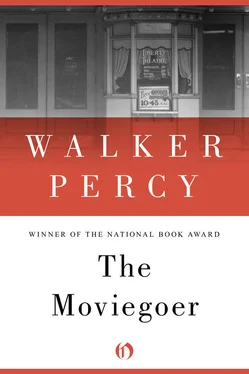Iii-oorrr goes the ocean wave, its struts twinkling in the golden light, its skirt swaying to and fro like a young dancing girl.
“I’d like to very much, Joyce. May I bring along my own fiancée, Kate Cutrer? I want you and Sharon to meet her.”
“Why shore, why shore,” says Joyce in a peculiar Midwest take-off of her roommate Sharon and sounding somewhat relieved, to tell the truth.
The playground is deserted. I notice that the school itself is locked and empty. Traffic goes hissing along Elysian Fields and the jaybirds jeer in the camphor trees. People turn in now and then at the school gate but they make for the church next door. At first I suppose it is a wedding or a funeral, but they leave by twos and threes and more arrive. Then, as a pair of youths come ambling along the sidewalk, I catch sight of the smudge at the hair roots. Of course. It is Ash Wednesday. Sharon has not quit me. All Cutrer branch offices close on Ash Wednesday.
We sit in Kate’s car, a 1951 Plymouth which, with all her ups and downs, Kate has ever cared for faithfully. It is a tall gray coupe and it runs with a light gaseous sound. When she drives, head ducked down, hands placed symmetrically on the wheel, the pale underflesh of her arms trembling slightly, her paraphernalia — straw seat, Kleenex dispenser, magnetic tray for cigarettes — all set in order about her, it is easy to believe that the light stiff little car has become gradually transformed by its owner until it is hers herself in its every nut and bolt. When it comes fresh from the service station, its narrow tires still black and wet, the very grease itself seems not the usual muck but the thrifty amber sap of the slender axle tree.
“Why didn’t you tell her about our plans?” Kate still holds the steering wheel and surveys the street. “I was in the library and heard every word. You idiot.”
Kate is pleased. She is certain that I have carried off a grand stoic gesture, like a magazine hero.
“Did you tell her?” I ask.
“I told her we are to be married.”
“Are we?”
“Yes.”
“What did she say to that?”
“She didn’t. She only hoped that you might come to see her this afternoon.”
“I have to anyway.”
“Why?”
“I promised her one week ago I would tell her what I planned to do.”
“What do you plan to do?”
I shrug. There is only one thing I can do: listen to people, see how they stick themselves into the world, hand them along a ways in their dark journey and be handed along, and for good and selfish reasons. It only remains to decide whether this vocation is best pursued in a service station or—
“Are you going to medical school?”
“If she wants me to.”
“Does that mean you can’t marry me now?”
“No. You have plenty of money.”
“Then let us understand each other.”
“All right.”
“I don’t know whether I can succeed.”
“I know you don’t.”
“It seems the wildest sort of thing to do.”
“Yes.”
“We had better make it fast.”
“All right.”
“I am so afraid.”
Kate’s forefinger begins to explore the adjacent thumb, testing the individual spikes of the feathered flesh. A florid new Mercury pulls up behind us and a Negro gets out and goes up into the church. He is more respectable than respectable; he is more middle-class than one could believe: his Archie Moore mustache, the way he turns and, seeing us see him, casts a weather eye at the sky; the way he plucks a handkerchief out of his rear pocket with a flurry of his coat tail and blows his nose in a magic placative gesture (you see, I have been here before: it is a routine matter).
“If I could be sure you knew how frightened I am, it would help a great deal.”
“You can be sure.”
“Not merely of marriage. This afternoon I wanted some cigarettes, but the thought of going to the drugstore turned me to jelly.”
I am silent.
“I am frightened when I am alone and I am frightened when I am with people. The only time I’m not frightened is when I’m with you. You’ll have to be with me a great deal.”
“I will.”
“Do you want to?” “Yes.”
“I will be under treatment a long time.”
“I know that.”
“And I’m not sure I’ll ever change. Really change.”
“You might.”
“But I think I see a way. It seems to me that if we are together a great deal and you tell me the simplest things and not laugh at me — I beg you for pity’s own sake never to laugh at me — tell me things like: Kate, it is all right for you to go down to the drugstore, and give me a kiss, then I will believe you. Will you do that?” she says with her not-quite-pure solemnity, her slightly reflected Sarah Lawrence solemnity.
“Yes, I’ll do that.”
She has started plucking at her thumb in earnest, tearing away little shreds of flesh. I take her hand and kiss the blood.
“But you must try not to hurt yourself so much.”
“I will try! I will!”
The Negro has already come outside. His forehead is an ambiguous sienna color and pied: it is impossible to be sure that he received ashes. When he gets in his Mercury, he does not leave immediately but sits looking down at something on the seat beside him. A sample case? An insurance manual? I watch him closely in the rear-view mirror. It is impossible to say why he is here. Is it part and parcel of the complex business of coming up in the world? Or is it because he believes that God himself is present here at the corner of Elysian Fields and Bons Enfants? Or is he here for both reasons: through some dim dazzling trick of grace, coming for the one and receiving the other as God’s own importunate bonus?
It is impossible to say.
SO ENDED MY THIRTIETH year to heaven, as the poet called it.
In June Kate and I were married. It was practicable to wind up my business affairs in Gentilly and to accompany my aunt to North Carolina sooner than I expected, since Sharon, now Mrs Stanley Shamoun, had become so competent that she was able to transact the light summer business without assistance, at least until my replacement could be found. In August Mr Sartalamaccia purchased my duck club for twenty five thousand dollars. When medical school began in September, Kate found a house near her stepmother, one of the very shotgun cottages done over by my cousin Nell Lovell and very much to Kate’s taste with its saloon doors swinging into the kitchen, its charcoal-gray shutters and its lead St Francis in the patio.
My aunt has become fond of me. As soon as she accepted what she herself had been saying all those years, that the Bolling family had gone to seed and that I was not one of her heroes but a very ordinary fellow, we got along very well. Both women find me comical and laugh a good deal at my expense.
On Mardi Gras morning of the next year, my Uncle Jules suffered a second heart attack at the Boston Club, from which he later died.
The following May, a few days after his fifteenth birthday, my half-brother Lonnie Smith died of a massive virus infection which was never positively identified.
As for my search, I have not the inclination to say much on the subject. For one thing, I have not the authority, as the great Danish philosopher declared, to speak of such matters in any way other than the edifying. For another thing, it is not open to me even to be edifying, since the time is later than his, much too late to edify or do much of anything except plant a foot in the right place as the opportunity presents itself — if indeed asskicking is properly distinguished from edification.
Further: I am a member of my mother’s family after all and so naturally shy away from the subject of religion (a peculiar word this in the first place, religion; it is something to be suspicious of).
Читать дальше












